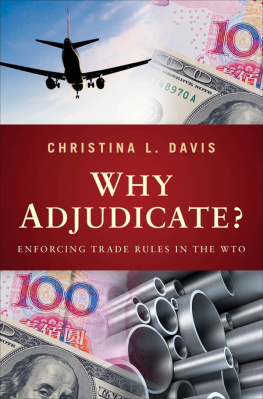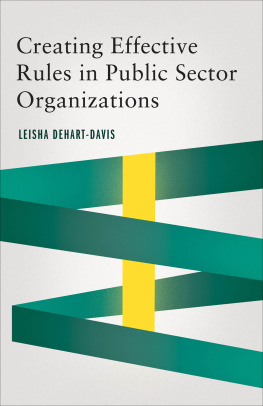Copyright 2012 by Princeton University Press
Published by Princeton University Press, 41 William Street, Princeton, New Jersey 08540
In the United Kingdom: Princeton University Press, 6 Oxford Street, Woodstock, Oxfordshire OX20 1TW
press.princeton.edu
All Rights Reserved
Library of Congress Cataloging-in-Publication Data
Davis, Christina L., 1971
Why adjudicate? : enforcing trade rules in the WTO / Christina L. Davis.
p. cm.
Includes bibliographical references and index.
ISBN 978-0-691-15275-2 (hardcover) ISBN 978-0-691-15276-9 (pbk.)
1. World Trade Organization. 2. Foreign trade regulation. 3. Administrative procedure. I. Title.
HF1385.D38 2012
382.92dc23
2011040102
British Library Cataloging-in-Publication Data is available
This book has been composed in Sabon
Printed on acid-free paper.
Typeset by S R Nova Pvt Ltd, Bangalore, India
Printed in the United States of America
10 9 8 7 6 5 4 3 2 1
Acknowledgments
READING ROBERT HUDECS BOOK Enforcing International Trade Law: The Evolution of the Modern GATT Legal System sparked my interest in trade adjudication. Although a legal scholar, Hudec had a deep appreciation for the political obstacles that shape use of the law. Competing interests within and between states give rise to inconsistent laws and trade disputes, and Hudec observed that in this context, law takes on a dimension of political theater. My book explains the process through which leaders performing for a domestic audience are more likely to turn to legal dispute settlement, and it shows how legal action provides information that allows the two sides to work out their differences. I never had the opportunity to meet Robert Hudec, but I hope he would have found some parts of this book interesting.
More directly, this project has developed through the critical questions and feedback over many years from scholars who have long been at the forefront of studying trade disputes. I thank Chad Bown, Marc Busch, and Greg Shaffer for extensive comments on the manuscript and earlier papers. Eric Reinhardt raised several important questions early on in the project that influenced my thinking about trade disputes, and he provides a service to the field by making his data on GATT disputes available. I owe much that I know about Japanese trade policy to long conversations with Ichir Araki and Tsuyoshi Kawase, who also introduced me to the wider network of trade experts in Japan. Many scholars and practitioners shared insights from their own research and experience with WTO dispute settlement. I am grateful to Peter Allgeier, Joshua Bolten, Stephen Chaudoin, Jeffrey Dunoff, James Durling, Roberto Enchandi, Gary Horlick, Keisuke Iida, Merit Janow, Moonhawk Kim, Akira Kotera, Giovanni Maggi, Clarita Costa Maia, Ken Matsumoto, Mitsu Matsushita, Leo Palma, Saadia Pekkanen, Amelia Porges, Timothy Reif, Stephanie Rickard, Sichir Sakuma, Jeffrey Schott, Susan Schwab, Richard Steinberg, Carmen Suro-Bredie, Yoichi Suzuki, Alan Sykes, Akihiko Tamura, Daniel Tarullo, Shintar Watanabe, Bruce Wilson, and Masaru Yamada. Others who asked to remain anonymous are not mentioned here by name, but contributed greatly to my research through their generosity in taking time away from their hectic schedules to grant me an interview.
The broader scholarly community has given valuable feedback. I would like to acknowledge my gratitude to Karen Alter, Sarah Brooks, Jeff Colgan, Cdric Dupont, Manfred Elsig, Songying Fang, Jeffry Frieden, Kishore Gawande, Judith Goldstein, Lucy Goodhart, Saori Katada, Daniel Kono, Jack Levy, Mark Manger, Ed Mansfield, Lisa Martin, Megumi Naoi, Sharyn OHalloran, Elizabeth Perry, Jon Pevehouse, Peter Rosendorff, Anne Sartori, Kenneth Scheve, Leonard Schoppa, Beth Simmons, Randall Stone, Jordan Tama, Alexander Thompson, Michael Tomz, and James Vreeland. Susan Pharr has been a dedicated advisor; she has overseen my undergraduate senior thesis and doctoral studies, and offered wisdom to help me during my uncertain times as assistant professor. I appreciate her willingness to continue to read my papers and guide my career development.
I am grateful for the opportunity to present parts of the book at Columbia University, The Graduate Institute in Geneva, Harvard University, Humboldt University in Berlin, Northwestern University, Ohio State University, Oxford University, Rutgers University, Sophia University in Tokyo, Stanford University, UCLA, University of Pennsylvania, University of Virginia, Yale University, and several academic conferences. At Princeton, the International Relations Colloquium offered an important venue to present early versions of my research. Excellent questions from the students and faculty at all of these institutions led me to clarify my argument and strengthen the evidence.
Colleagues and visiting scholars at Princeton University contributed to a rich intellectual environment. Joanne Gowa gave the right mix of criticism and support to keep me going through this long project. Always ready to exchange comments on our research or share stories about our children, she has been the ideal mentor and a great friend during my years at Princeton. Amy Borovoy, Amaney Jamal, and Sophie Meunier offered encouragement and advice on how to more effectively communicate my ideas and shared in those lighter moments necessary to keep everything in perspective. Robert Keohane, Helen Milner, and Andrew Moravcsik provided useful comments that challenged me to think more broadly when I became too focused on the intricacies of trade disputes. I was fortunate to have Stephen Kaplan and Krzysztof Pelc across the hall during my final year of completing the project, as they gave detailed comments on the manuscript and kept asking when I would be finished. Daniela Campello, Leany Lemos, and Valeria Silva helped me to understand the politics of Brazilian trade policies both through sharing their knowledge and introducing me to officials in Brazil.
The book involved substantial data collection, for which I relied on many research assistants. First and foremost, Raymond Hicks has been an invaluable source of advice and made it almost too easy to add more variables to the analysis with his efficient help collecting data. I cannot thank him enough for the countless times he quickly responded to my questions and requestsoften going beyond what I had thought to ask for. In addition, I appreciate the work by many undergraduate and graduate students who diligently coded trade reports and provided background research for the case studies: Ryan Brutger, Wamiq Chowdhury, Courtenay Dunn, Jonathan Elist, Crystal Frierson, Mariko Hayashi, Mark Jia, Ann Lee, Lubna Malik, Jennifer Oh, Anbinh Phan, Eri Saikawa, John Stevenson, Jason Weinreb, Meredith Wilf, and Derek Wong. I thank Wendy Hansen for sharing her data on industry associations, and I thank Doug Weber at the Center for Responsive Politics for assistance with data on political contributions.
John Odell taught me to see the politics behind negotiation strategies from a broader perspective. His leadership brought out the best in each of the submissions for an edited volume on trade negotiations during a series of conferences, and I am happy to be able to publish an abridged version of my contribution to that volume as in this book. I thank Cambridge University Press for permission to reprint parts of Do WTO Rules Create a Level Playing Field for Developing Countries? Lessons from Peru and Vietnam. from John Odell, ed.












